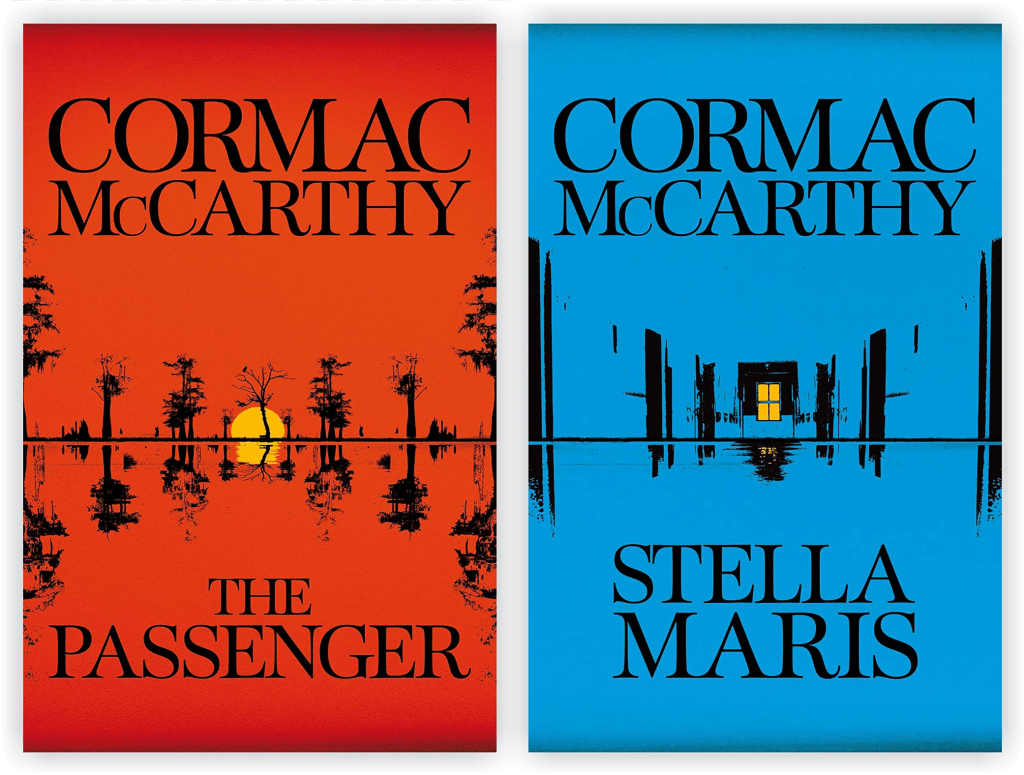Few recent books have been as eagerly awaited as the pair of novels that Cormac McCarthy published in succession late last year. McCarthy, one of America’s most celebrated living writers, last published a novel in 2006, his Pulitzer Prize-winning The Road. After a hiatus of over 15 years, McCarthy brought out The Passenger in late October 2022, followed six weeks later by a companion volume, Stella Maris.
The closely linked novels—which really form a single family narrative, in two parts—tell the story of Bobby and Alicia Western, children of a scientist who had worked at Los Alamos to develop the atomic bomb. They are devoted to each other, in part because of a difficult home life: their parents divorced, both dying eventually of cancer and leaving the children in the care of grandparents. The siblings are also thrown together because of their difficulty fitting in anywhere else. Both are preternaturally intelligent, with few real peers. Bobby goes to study at Stanford before dropping out in order to race cars in Europe, where he suffers a serious accident and remains for a long time in a coma. As The Passenger begins, he is working as a salvage diver. Alicia is a prodigy, one of the top mathematical minds in the world, but also suffers from schizophrenia. She has recurring visions of fantastic, carnivalesque visitors who torment her.
“Close,” however, does not begin to describe Bobby and Alicia’s relationship. They are in love, and their love for each other is the tragic center around which the two novels rotate. Early in The Passenger, a friend named Sheddan warns a woman that Bobby is not available. Asked whether he’s gay, Sheddan replies, “It’s worse than that…. He’s in love with his sister.” Similarly, in Stella Maris Alicia tells her therapist that she had realized years earlier that she loved her brother “in spite of the laws of Heaven. And that I would never love anyone else.” When pressed later, she repeats, “There wasnt anyone else. There never would be. There wasnt for him either.” Whether they have consummated this incestuous relationship remains unclear. Sheddan believes that they have. Alicia, however, asserts to her therapist that, despite her best efforts and to her lasting dismay, Bobby had refused to take that ultimate step.
The plot of these novels is easily told. The Passenger opens with a hunter discovering the body of Alicia, who has committed suicide on Christmas morning. This event, about which we learn more only in Stella Maris, remains in the background as we shift to Bobby, on a salvage mission for a sunken plane that has crashed off the coast of New Orleans. He and his partner find a mystery: the plane’s black box is missing, as are the pilot’s flight bag and, most perplexingly, one of the passengers. Soon Bobby is being questioned by a pair of vaguely menacing investigators, possibly FBI agents, although their identity never becomes clear. After learning that his apartment has been searched, he goes on the lam. For the rest of the book he tries to avoid discovery as his bank accounts are frozen and his car impounded, while the net draws tighter. Finally he flees to the south of Spain to live out his days in a secluded windmill. Neither the original plane crash nor the mysterious investigation of Bobby, which may have something to do with his father’s work on the bomb, are ever really clarified; this lack of resolution is a weakness, even if plot is not really the point of these novels.
Stella Maris, though published second, takes place before The Passenger. Alicia, who had gone to visit Bobby in Europe, returns home when the doctors, not expecting him to recover from his coma, pressure her to end his life support. She checks herself into a mental institute named, like the book, Stella Maris. The novel’s seven chapters consist of her conversations with her therapist, during which we learn more about her family, her interests in mathematics and music, her love for her brother, and her deepening sense that life holds no meaning. Some of their conversations end with the terse comment, “Time’s up.” We sense that it is not only the therapy session that is coming to an end.
With these twin novels, the 89-year-old McCarthy shows that he remains a literary artist of great skill. Except for the frequent, allusive, and name-dropping forays into mathematical theory—obviously dear to McCarthy’s heart, but unfortunately opaque to any reader not versed in the history of math and physics over the last century—the prose is taut and spare. (Though also, the squeamish reader should be forewarned, frequently foul.) Known for his sparse use of punctuation (he uses no quotation marks) and tight dialogue, McCarthy moves the reader along rapidly in spite of the books’ relative lack of action. The Passenger maintains an ominous sense of foreboding across almost 400 pages; in Stella Maris, about half that length, the reader nervously feels Alicia inching closer and closer toward suicide. But McCarthy also revels in fast-paced, punning, witty wordplay and repartee, especially between Bobby and Sheddan (a brilliant character), or Alicia and her chief hallucination, the Thalidomide Kid, a semi-deformed figure with flippers for arms. These dialogues are often breathtakingly clever and remind one of the pregnant nonsense spoken by Shakespeare’s fools.
The novels are also structurally complex. Just as the lives of Bobby and Alicia are intimately intertwined at every stage but their love doomed to remain unfulfilled, so too has McCarthy cleverly segregated their stories into distinct novels that refer constantly back to each other but nevertheless remain confined within their separate covers. The entire work, in keeping with its interest in music, has a fugal, contrapuntal character. The Passenger alternates between Bobby’s story and short excerpts from Alicia’s hallucinogenic visions; Stella Maris allows themes from one conversation between Alicia and her therapist to reappear in the next; even the chronology of the two, with the first book taking place after a suicide that has not yet occurred in the second, creates a kind of endless da capo.
At the level of ideas, McCarthy is chasing the biggest questions of all: Is there a God? Does life have any meaning? Yet his pursuit of these questions is not entirely satisfying. Most reviews of the novels have described them, aptly, as expressing a bleak, existential despair. One finds gestures in this direction on almost every page. Early in The Passenger the Kid tells Alicia, “Every worldline is discrete and the caesura ford a void that is bottomless. Every step traverses death.” Later someone says to Bobby, “I know you dont believe in God. But you dont even believe that there is a structure to the world. To a person’s life.” In Stella Maris Alicia declares, “The world has created no living thing that it does not intend to destroy,” and that if there is a mind behind this destruction, “then it’s all worse than we thought.” She claims that “at the core of reality lies a deep and eternal demonium.” In a fascinating observation, she claims that infants cry from a sense of rage and injustice at “a breach of some deep and innate covenant having to do with how the world should be and wasnt.” One is tempted to read this as a rejoinder to Augustine’s famous assertion in his Confessions that the cries of infants are a sign of original sin and their desire, even from the cradle, to bend others to their will.
This is not the whole story, however. As in The Road —which, for all its bleak apocalypticism, ends with a faint possibility that humanity might yet triumph —McCarthy again allows a glimmer of hope to shine through these novels. In The Passenger’s concluding sentence, Bobby blows out a lamp, lies back in the dark, and thinks “that on the day of his death he would see [Alicia’s] face and he could hope to carry that beauty into the darkness with him, the last pagan on earth, singing softly upon his pallet in an unknown tongue.” This reference to him as the “last pagan” is ambiguous. Are we all pagans now, so that he is something like the last man? Or is Bobby the last of the pagans, to be followed by a new kind of belief? And if he slips away into “darkness,” he nevertheless carries beauty with him and sings in a new language. By the same token, Alicia, when asked outright by her therapist whether she is an atheist, ironically replies, “God no. Those were the good old days.” Describing her mathematical investigations, she repeatedly indicates that she finds herself drawn toward a kind of platonism, suggesting the possibility of some real, enduring world behind this realm of appearances and flux. As Stella Maris nears its end, she reports that “I began to have doubts about my heretofore material view of the universe.”
Such comments are the exception rather than the rule. They surely do not outweigh the books’ dominant impression of hopelessness and angst. Yet McCarthy, while leading us right up to its brink, seems unwilling to commit, finally and irrevocably, to the nihilism that saturates so much of his story. The author famous for not giving interviews is equally reticent in his fiction; he wants to have his existential despair while also, ever so slightly, hedging his bets. Readers will react to this differently. Some may view it as an honest confrontation with life’s tragic ambiguity. Others may find the refusal to take the last step into nihilism a sign of moral or philosophical cowardice; still others may regard the same refusal as a welcome affirmation of at least some minimal faith in humanity. And perhaps less charitable readers will see in McCarthy’s coyness a certain philosophical pretentiousness, a kind of Nietzschean posturing that does not finally persuade even the poser.
I am not inclined to be so harsh; these novels provoke deep questions, including ones I lack the space even to touch on, about the nature of language, for example, or the line between sanity and madness. They will reward reading and even re-reading. Nevertheless, they are to some extent undercut by their (apparent) philosophical premises. This becomes most clear if we take up McCarthy’s invitation to read the story of Bobby and Alicia as a tragedy. Their forbidden love inevitably recalls that most famous tale of incest, the story of Oedipus, which McCarthy deliberately calls to mind. Sheddan, who at one point labels Bobby an “enemy of God” and whose words always repay careful consideration, tells him, “You’re a missing Greek tragedy, Squire…. Little I’d like better than to have a peek into those intrafamilial sordidities concerning which you remain so circumspect. Hard money says it would make the Greeks look like Ozzie and Harriet.” He imagines a short note reading, “Today I met a man named Robert Western whose father attempted to destroy the universe and whose supposed sister proved to be an extraterrestrial who died by her own hand.” This imaginary note is signed, “Yours, Sigmund,” suggesting again that we need to ponder Bobby in light of Oedipus.
McCarthy drops other scattered references to tragedy. Bobby’s grandmother asks him, “Do you think this family has a curse on it?” Bobby replies, “What, like the sins of the fathers?”—another gesture toward Oedipus and his children. Later, a different character says to Bobby, “You see yourself as a tragic figure.” Bobby denies it. But is he right? While in hiding, Bobby once comes back from the store with a load of groceries, some tools, and “two boxes of paperback books. Victorian novels that he hadnt read and wouldnt but also a good collection of poetry and a Shakespeare and a Homer and a Bible.” Even the enemy of God, it seems, prefers classic, archetypal tales of tragedy and of moral confrontation on a grand scale.
Yet the tragedy of Oedipus makes sense only against a moral framework. It requires the curse of the gods. No gods, no curse; no curse, no tragedy. Without some broader framework of meaning, we have not tragedy, but merely absurdity. As Alicia says to her therapist, “People prefer fate to chance…. I think most people believe not only in a book of life but in a book of their life. Fate can be appeased, gods prayed to. But chance is just what it says.” Just because people prefer fate to chance, of course, does not mean that they’re right. But Alicia’s comment rightly indicates that tragedy requires something more than chance. It requires fate, requires us to believe that in the end, no matter how tempted we might sometimes be to doubt it, life is more than sound and fury, signifying nothing.Insofar as he casts doubt upon the gods, or fate, or any larger structure of meaning underlying the universe, McCarthy makes it impossible for us to follow his own hints that we read these novels as tragedy in the tradition of the Greeks. The story of Bobby and Alicia Western can be a personal tragedy set against the larger tragedy of the 20th century only if we, like Alicia, permit ourselves doubts about the purely material view of the universe. Only if we have a real chance of carrying some beauty into the darkness and one day singing a new song. Only, we might say—borrowing from McCarthy’s titles and remembering that “Stella Maris” is also an old title for Mary, the virgin mother, sometimes known as our Lady, “star of the sea”—only if there remains some hope that we passengers on the sea of life, the sea that is so frequently present in The Passenger, might yet be guided by that sea’s star, so that the sins of the fathers may not be eternally visited upon their sons.






Please note that we at The Dispatch hold ourselves, our work, and our commenters to a higher standard than other places on the internet. We welcome comments that foster genuine debate or discussion—including comments critical of us or our work—but responses that include ad hominem attacks on fellow Dispatch members or are intended to stoke fear and anger may be moderated.
With your membership, you only have the ability to comment on The Morning Dispatch articles. Consider upgrading to join the conversation everywhere.